2022 Annual Report
go.ncsu.edu/readext?929880
en Español / em Português
El inglés es el idioma de control de esta página. En la medida en que haya algún conflicto entre la traducción al inglés y la traducción, el inglés prevalece.
Al hacer clic en el enlace de traducción se activa un servicio de traducción gratuito para convertir la página al español. Al igual que con cualquier traducción por Internet, la conversión no es sensible al contexto y puede que no traduzca el texto en su significado original. NC State Extension no garantiza la exactitud del texto traducido. Por favor, tenga en cuenta que algunas aplicaciones y/o servicios pueden no funcionar como se espera cuando se traducen.
Português
Inglês é o idioma de controle desta página. Na medida que haja algum conflito entre o texto original em Inglês e a tradução, o Inglês prevalece.
Ao clicar no link de tradução, um serviço gratuito de tradução será ativado para converter a página para o Português. Como em qualquer tradução pela internet, a conversão não é sensivel ao contexto e pode não ocorrer a tradução para o significado orginal. O serviço de Extensão da Carolina do Norte (NC State Extension) não garante a exatidão do texto traduzido. Por favor, observe que algumas funções ou serviços podem não funcionar como esperado após a tradução.
English
English is the controlling language of this page. To the extent there is any conflict between the English text and the translation, English controls.
Clicking on the translation link activates a free translation service to convert the page to Spanish. As with any Internet translation, the conversion is not context-sensitive and may not translate the text to its original meaning. NC State Extension does not guarantee the accuracy of the translated text. Please note that some applications and/or services may not function as expected when translated.
Collapse ▲2022 Annual Report
2022 Program Highlights
Livestock and Field Crops
When dry weather caused the potential for a winter feed shortage, Extension taught producers how to supplement their feed supplies with a Summer Annuals workshop. As a result, producers were able to supplement their forage production to help them with winter feed supplies. Seven producers planted a summer annual forage to supplement their hay production. Two producers also planted oats as a short term temporary forage. In the end, all participants indicated a feed surplus for the year. Some were able to add an average of $4,200 to their bottom line by selling their excess hay.
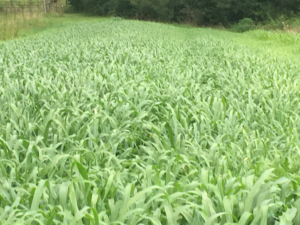
Pasture with summer annuals
Community Development
The Burke County staff decided to “Extend a Helping Hand” for the holiday season as a community service project. A request was sent out to the community to help identify families that may need a little extra help during the holiday season. The staff selected a family to help from the nominations received. Clothing, toys, food and personal care items were collected, wrapped, and donated to a single mom with two children and a grandchild in the home. The family shared how appreciative they were for donation of items to make their holiday special. They shared that this small gesture helped them financially and mentally. Because of “Extending a Helping Hand”, the family was able to enjoy their holiday with less stress and worry and they learned about N.C. Cooperative Extension and the programs offered in Burke County.

Extending a Helping Hand
4-H Youth Development
As a result of sharing a local favorite, Binding Memories T-shirt Quilt Workshop, at a state conference, agents across the state were inspired to offer the workshop in their counties. The Burke County 4-H agent saw an opportunity to expand the workshop to a larger audience by offering it virtually while still offering an in-person option in Burke County. Altogether, 34 youth ages 10 and up were registered for the workshop. The in-person sessions were recorded and made available online. Agents across the state and the country were able to host “watch parties” with their local youth or individual participants were able to watch the sessions and work at their own pace to complete a memories quilt.
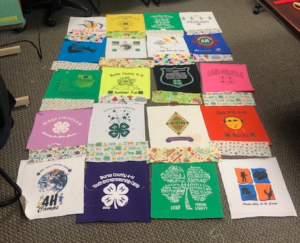
Memories T-Shirt Quilt
Family and Consumer Sciences
Older adults often lack the level of digital media literacy necessary to navigate the world of technology. Seniors are able to save money when they properly understand the technology options available to fit their needs. While partnering with the local senior centers in the county, the Family and Consumer Sciences agent was able to offer technology classes to seniors on a variety of subjects including internet safety, using a smart TV, connecting to WIFI and online bill pay.
During the online bill pay class, participants reviewed their current cable/internet bills to determine if they were using or needed the services they were currently paying for. One participant discovered they were paying an outrageous amount for services they didn’t use or need. As a result of the class, this senior was able to reduce their monthly bill by $60 per month.

Seniors learning technology
Consumer Horticulture
Volunteers are essential to the N.C. Cooperative Extension program and help implement programming that would never be possible with just one agent. The horticulture program’s main source of volunteers is the Extension Master Gardener program that teaches Burke County citizens how to be better gardeners.
The Horticulture Extension Agent began a class with 19 students in January to become Extension Master Gardener interns in April. These new Master Gardener graduates joined the current group in assisting with fairs, grounds maintenance, educational programs and more to earn their volunteer hour requirements for the year. Extension Master Gardeners help people to be better gardeners by sharing their knowledge. Some of these 19 people were new arrivals to Burke County, some were recently retired while others wanted to do useful things with their time. In turn, these newly graduated master gardeners will touch the lives of many of the 90,000 Burke County citizens in their future endeavors.
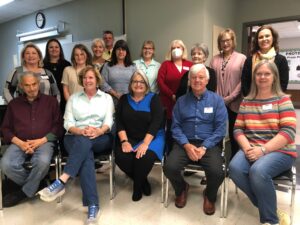
Extension Master Gardener
Class of 2022
Integrated Program – Agriculture and 4-H
Youth today often have very little knowledge of agriculture and often have little opportunity to enjoy outdoor recreation. Extension planned and hosted a Farm to Fish Day for 4-H Summer Fun participants. Eight Burke County youth participated, and all were from non-farm families with limited exposure to agriculture and the outdoors. These youth had the opportunity to learn about livestock production, animal husbandry, farm animal breeds, cattle, sheep, horses, poultry, game birds, and beekeeping. These youth also learned about pond management, freshwater fish species, fishing tackle and conservation. All participants learned how to bait a hook, and land a fish. Five participants had never caught a fish and all participants caught at least 5 and learned the different freshwater species. In providing an opportunity for youth to gain knowledge and skills about agriculture, livestock and poultry production and the outdoors, Extension can emphasize the importance of agriculture in Burke County.
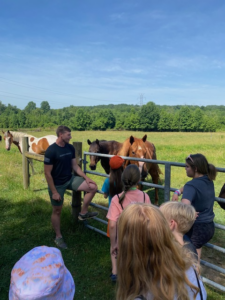
Farm to Fish Day
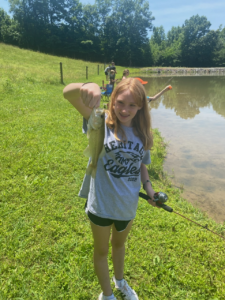
Farm to Fish Day
Other Programming
The Community Resource Development program with N.C. Cooperative Extension, strives to provide information, education, and training to meet the needs of Extension professionals throughout North Carolina by offering in-service training opportunities. One of the needs identified was facilitation skills for both in person and virtual environments. Often new professionals do not feel competent or confident in bringing together groups, leading discussions, and building consensus. In addition, many groups were asked to turn to virtual or hybrid discussions during the pandemic, which was new ground for many Cooperative Extension professionals. The N.C. Cooperative Extension, Master Facilitator team offered “Connections That Work “ to help participants maximize both hybrid and in person facilitation. Approximately 40 Extension personnel attended and completed this full day training and they were given information about how to become a certified Extension Facilitator. Participants learned tools and techniques that they could use immediately in any environment, whether they were facilitating in person or behind a screen! They also learned how to motivate a group, build consensus, maintain focus, generate ownership, and inspire action. With additional Extension personnel becoming competent facilitators, this will position N.C. Cooperative Extension to be a benefit and resource for communities throughout North Carolina.
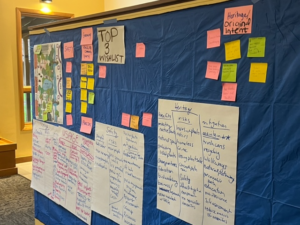
Facilitator Training
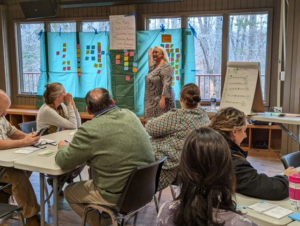
Extension Professionals attending Facilitator Training




